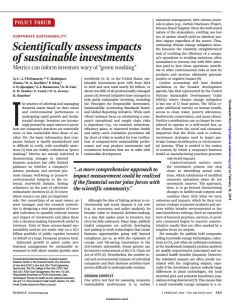
C. J. Vörösmarty, V. Rodríguez Osuna, D. A. Koehler, P. Klop, J. D. Spengler, J. J. Buonocore, A. D. Cak, Z. D. Tessler, F. Corsi, P. A. Green and R. Sánchez
Scientifically Assess Impacts of Sustainable Investments
Metrics can inform investors wary of “green washing”
Science, 2018
What's inside?
Investments in sustainable businesses are rising and science can help guide their decisions.
Recommendation
Corporate sustainability is an increasingly important factor to consider for investors. It relates to the environmental and social impact of a company’s business practices, services and/or product. Professor Charles J. Vörösmarty and colleagues outline why current criteria used to assess corporate sustainability are inadequate, and how they can lead to suboptimal investment decisions. They propose the integration of more transparent and scientific data to bolster the metrics of corporate sustainability. The article will engage executives and investors interested in the sustainability of businesses.
Take-Aways
- Investments in sustainable businesses are growing.
- Current measures of corporate sustainability are inadequate.
- The sustainability impacts of businesses must be considered within a broader context.
- Scientific data helps assess corporate sustainability.
- Non-financial data are important for sustainability assessments.
Summary
Investments in sustainable business are growing.
Corporate sustainability describes a business’ external impact on the environment and social welfare. It is an increasingly common factor to consider for investors. In the United States, sustainable investments now make up approximately a fifth of all professionally managed assets.
Current measures of corporate sustainability are inadequate.
Current assessments of corporate sustainability often consider internal business practices but not external downstream environmental and social impacts.
“A company that is highly rated for reducing air pollution could simultaneously present material risks to occupational health and safety, or at the expense of clean water.”
The measures reported by companies are also not standardized and often difficult to confirm. This can lead to “green washing,” where companies give a false sense of their sustainability impacts.
The sustainability impacts of businesses must be considered within a broader context.
Carbon emissions are an easy measure of sustainability impact, but there are other important factors to consider. They include public health, clean water availability, poverty mitigation and the conservation of biodiversity. These factors must be considered together to accurately assess a company’s net environmental and social impact.
Scientific data helps assess corporate sustainability.
Corporate sustainability data can be integrated with scientific and publicly available data. These include geological observation and modeling, public health and epidemiology data, development and analyses of resource materials.
“ The willingness of corporations to share detailed information in such an alliance – as increasingly demanded by their investors – will be as much a shift in corporate culture as in how companies report on sustainability issues.” ”
Companies, private organizations and scientists will have to work together to create a standardized framework incorporating these different data types. Such a framework will provide intuitive metrics to assess corporate sustainability.
Non-financial data are important for sustainability assessments.
Companies should share their environmental and social impact data along with financial data. This kind of information will help inform and guide asset owners, stakeholders and investors.
“The positive social and environmental impacts of individual companies and their business activities have proven difficult to systematically evaluate.”
As sustainable business practices should not adversely affect financial performance, voluntarily sharing such information makes a business more attractive for sustainable investments.
About the Authors
Charles J. Vörösmarty is a founding director of the Environmental Sciences Initiative and Einstein Professor of Civil Engineering at the City University of New York (CUNY) Advanced Science Research Center (ASRC). Vanesa Rodríguez Osuna is a senior scientist and project manager at CUNY ASRC.
This document is restricted to personal use only.
My Highlights
Did you like this summary?
Read the articleThis summary has been shared with you by getAbstract.
We find, rate and summarize relevant knowledge to help people make better decisions in business and in their private lives.
Already a customer? Log in here.
















Comment on this summary